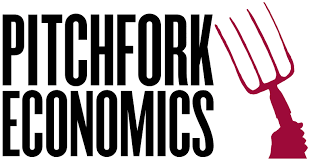
Pitchfork Economics: Pirate Equity with Jim Baker
June 1, 2022
Private Equity Stakeholder Project Jim Baker was a recent guest on Nick Hanauer’s Pitchfork Economics podcast.
Pitchfork Economics’ host Hanauer interviews economic and political thinkers in an exploration of society’s growing inequality. Baker explained the private equity’s growth and the consequences of this growth for the rest of us.
The interview was also the basis for a Business Insider editorial by Paul Constant: How private equity firms cash in on struggling businesses like Toys R Us and leave retail employees high and dry.
“Private equity firms invest capital in companies perhaps to take them private,
will then seek to dramatically grow cashflow at that company for their own and their investors’ benefit, and then will sell the company then keep the profits,” Baker told listeners.
“They’re making money destroying companies,” the hosts concluded, also referring to it as “pirate equity, the pillaging of American companies by these big private equity funds.”
Both Hanauer and his co-host David Goldstein discussed personal examples of how they were impacted by private equity. Goldstein’s father was a psychiatrist who did his residency and taught at Hahnemann University Hospital in Philadelphia, which served a lot of inner city residents who suffered from poverty. In 2018 the hospital was bought by a private equity firm, and two years later, it was shut down and “selling off its very valuable real estate.”
Hanauer described how his family sold its “profitable, well managed company with a limited amount of debt and absolutely clean inventory family business.” The company was bankrupt within a year after it merged with a competitor owned by a private equity company.
Instead of private equity being “groups of people buying companies and ideally improving them and selling them for profit later,” Hanauer said, “what it has devolved into is this incredibly exploitive, corrupt practice of using levered money to buy companies, and then extract[ing] all of the value out of it, and kick[ing] the rest of it to the curb and mak[ing] it somebody else’s problem – usually the public’s.”
The hosts discussed the cases of Toys R Us and KMart, and how private equity firms drove the largest retail chain bankruptcies since 2012. They detailed how one in four retail workers who live near the poverty threshold are laid off as a result of these bankruptcies in store closures, and many others have lost their pensions, sharing outrage about “one of the most egregious outcomes” when private equity firms “acquire a company and wipe out their pensions and leave the retirees and and the government picking up the tab.”
Baker shared results of PESP’s 2019 report on how Wall Street firms are pillaging American retail. He noted that while the report is a couple years old, many of the trends highlighted in the report are “absolutely ongoing to this day.”
Private Equity Stakeholder Project (2019): Pirate Equity: How Wall Street Firms are Pillaging American Retail
Written by Private Equity Stakeholder Project, The Center for Popular Democracy, and United for Respect, Pirate Equity: How Wall Street Firms are Pillaging American Retail documented the devastating consequences of private equity’s march through the retail sector.
The report revealed that between 2009-2019, 597,000 people working at retail companies owned by private equity firms and hedge funds have lost their jobs. These retail closures are also associated with an estimated 728,000 indirect job losses. Another million jobs are at risk at other retailers owned by these Wall Street giants.
Over the past decade, these companies have made substantial controlling investments in 80 retail companies. The layoffs at private equity-owned retailers stand in contrast to the one million jobs that the retail sector as a whole added over the same period of time. The effects are disproportionately felt by women and people of color.
Baker talked about how in 2022 “we’re still seeing large private equity…buyouts or attempted buyouts of retailers.” Private equity firms, he explained, are in the process of trying to acquire Kohl’s which has more than 100,000 workers. PE firms Leonard Green & Partners and Sycamore Partners both have records of loading companies with debt to take out dividends for themselves. The firms have records of taking companies into bankruptcy with thousands of workers losing their jobs.
The hosts and Baker identified how the dramatic levels of debt that the private equity firms use to acquire companies can lead to devastating consequences to stakeholders, including likely job loss, and may hamper the ability of the firm to effectively innovate. They discussed how policy reform proposals like the Stop Wall Street Looting Act and specific interventions in industries could help to address the worst impacts of private equity on workers and communities.
Listen to the full podcast here.
